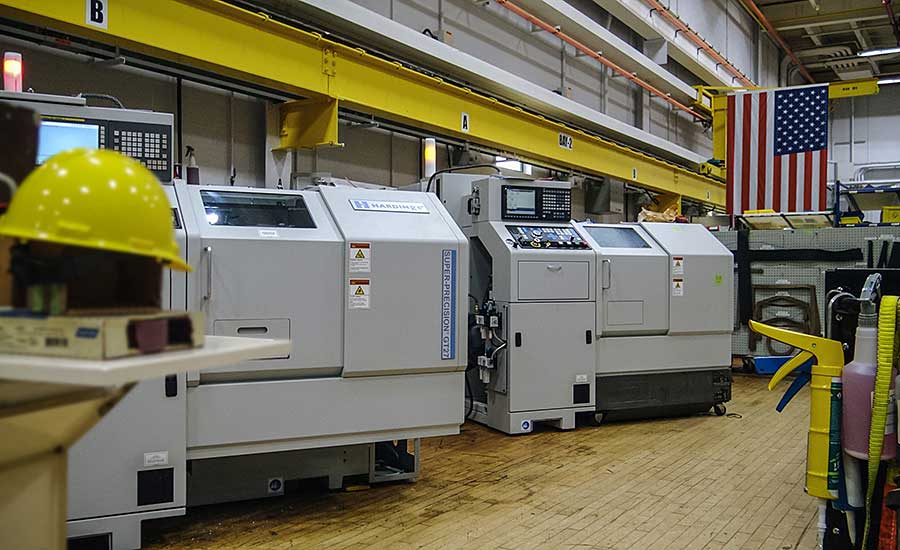Geopolitical Forces Drive Record-Breaking Reshoring

The recent saber-rattling in the Taiwan Strait only reinforced Hardinge’s decision to shift manufacturing from Taiwan to Elmira, NY. Photo courtesy Hardinge Inc.

In August, Micron announced it will invest $40 billion in semiconductor manufacturing with the help of the CHIPS and Science Act, creating 40,000 U.S. jobs. Photo courtesy Micron Technology Inc.


Geopolitical forces are accelerating the growing trends of reshoring and foreign direct investment (FDI). Over the last decade, an expanding understanding of the routine logistics costs of offshoring drove an upward trend of reshoring. But now, our lack of self-sufficiency in many essential products has been revealed by the COVID-19 pandemic, the risk of China decoupling, domestic supply chain growth for clean energy, and the Russian invasion of Ukraine. Geopolitical risk and the advantages of domestic manufacturing are motivating more and more companies to move production back to the U.S., driving job announcements to record-breaking highs.
In 2021, the private and federal push for domestic supply of essential goods drove reshoring and FDI job announcements to a record 261,000. We forecast about 350,000 job announcements in 2022, which will bring the total jobs announced since 2010 to over 1.6 million. The Reshoring Initiative Data Report discusses the trend and how reshoring will continue to be key to U.S. manufacturing and economic recovery.
The risk of China decoupling is an important consideration for companies producing and sourcing there. There are already a number of red flags. China’s military strength is up. Economic growth is near zero and uncertain. Foreign companies are less welcome. Labor shortages are ongoing and wages are rising. And, China’s zero-Covid policy is expected to continue through at least 2027. As U.S. companies recognize that China will be an unreliable source of goods, they will increasingly choose to reshore.
One such company is Hardinge Inc., a multinational machine tool builder headquartered in Berwyn, PA. The company, which began operation in 1890, is best known for its lathes. The recent saber-rattling in the Taiwan Strait only reinforced Hardinge’s decision to shift manufacturing from Taiwan to its plant in Elmira, NY. Hardinge cited lead time, freight cost, tariff uncertainty and geopolitical concerns as some of the reasons for reshoring, but any escalation of tensions in the strait would create an additional threat to global supply chains.
Indeed, Bloomberg calculated that “almost half of the world’s container ships and 88 percent of larger container ships transited the Taiwan Strait this year.” Actual hostilities in Taiwan would have a dramatic impact on shipping capacity, devastating U.S. global supply chains.
Many reshoring announcements in 2021 were driven by government support for U.S. production of essential products, which was spurred by import shortages related to the pandemic and the dramatic increases in freight cost and delivery time. Other important forces included greater U.S. competitiveness due to the residual effects of the 2017 corporate tax and regulatory cuts; increased recognition of the total cost of offshoring; and rising concern over geopolitical tensions.
For example, in August 2020, United Arab Emirates-based Neopharma shuttered its U.S. penicillin plant due to bankruptcy, leaving the U.S. solely dependent on China for penicillin. In 2021, Georgia-based Jackson Healthcare reopened the plant, now named USAntibiotics, returning antibiotic production to the U.S. “Our reliance on China and foreign-sourced raw materials for antibiotic production presents a severe deficiency in the reliability of the supply chain and actively undermines our national security and public health interests,” says Rep. Diana Harshbarger, R-TN.
Supply Chain Disruption Spurs U.S. Investment
GM, Micron, Lockheed and other companies are reshoring and investing in U.S. manufacturing due to global supply chain disruptions. In August, Micron announced it will invest $40 billion in semiconductor manufacturing with the help of the CHIPS and Science Act, creating 40,000 U.S. jobs. Qualcomm, a leading fabless semiconductor company, announced plans to increase semiconductor production in the U.S. by 50 percent over the next five years.
In 2022, GM announced a $7 billion investment in four Michigan electric vehicle (EV) manufacturing facilities that will create 4,000 new jobs. “The geopolitical risks posed to automotive supply chains by the war in Ukraine are real, but GM is managing the pressure, and is pushing ahead with its plans to speed up launches of new electric vehicles,” says GM President Mark Reuss.
Michigan-based Smart Vision Lights, a manufacturer of lighting products for machine vision systems, reshored production from China and Taiwan to the U.S. due to supply chain weakness and reliability issues. Smart Vision invested in a 30,000-square-foot expansion to add a machine shop and assembly, eliminating the risk of offshore suppliers.
France-based Schneider Electric, a manufacturer of energy management and automation equipment, plans three new assembly facilities in North America for faster time to market. “Our future is calling for a more resilient and sustainable supply chain and that’s exactly what we’re seeking to deliver with this latest investment,” says Annette Clayton, CEO and president of Schneider Electric North America. The $100 million investment to strengthen regional capability and increase manufacturing capacity will create upward of 1,000 new jobs.
In June, I testified to the U.S.-China Economic and Security Review Commission, outlining the needed actions by companies and government. While there are many pieces to the puzzle, the No. 1 objective for reducing our dependency on China is to boost U.S. cost competitiveness. You can view the hearing and read written testimony and supporting appendices at this link. (In the video, I present at 7:45.) Considering reshoring? For help, call me at 847-867-1144 or email me at harry.moser@reshorenow.org.
Looking for a reprint of this article?
From high-res PDFs to custom plaques, order your copy today!






